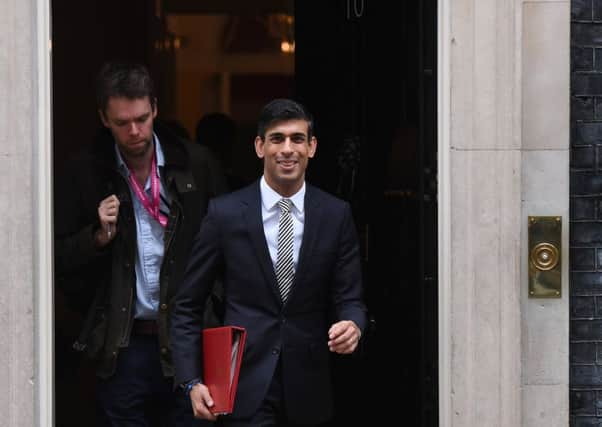Bill Jamieson: Rishi Sunak’s just-in-time policies must nurture green shoots


On a personal level, her performance was widely praised. Could Sunak follow? The Scottish budget (283 pages, with annexes) had, of course, been well prepared in advance. But while Sunak has much detail to update and refresh, the bulk of the budget measures he will announce on 11 March will already have been drafted. Indeed, it is likely he will already be giving thought to changes in tax rates and levels to be announced in September. It is then he will be able to present a fiscal statement more credibly regarded as his own.
For all the current attention on the fractious power dynamics at the top of the UK government, and those ambitious infrastructure projects trailed in the election campaign, it is on the UK’s economic performance – now and in the near future – to which close attention will be given next month.
Advertisement
Hide AdAdvertisement
Hide AdBoth in Scotland and south of the border there is a desperate desire to break free of the Brexit chaos and uncertainty that have blighted economic performance for three and a half years.
Tax cuts – personal and corporate – are still the swiftest way of boosting confidence and morale and lifting the pace of economic growth. Higher government spending via infrastructure work may be more effective in the medium to long term, but it takes time for the benefits to show through. And this is an administration keen to gain momentum and prove itself through early wins.
There are some encouraging signs. But little by way of momentum was evident in commentary surrounding official data released last week. The figures showed the UK economy flatlined in the final three months of last year, with service sector growth weak and manufacturing shrinking.
During the quarter, the services sector grew by just 0.1 per cent while industry shrank by 0.8 per cent – extending a decline that began early in 2019.
Business investment shrank by one per cent as firms were deterred from investing in new offices and machinery. Overall across the UK, the economy grew by just 1.4 per cent last year.
And there seemed little to cheer about here in Scotland. The latest State of the Economy report, published by the Scottish Government’s chief economist Gary Gillespie last Friday, said that despite the immediate risk of a no-deal Brexit being removed, uncertainty remains – particularly for those reliant on new trade agreements.
The official and independent forecasts for the Scottish economy suggest growth of around one per cent in 2020, rising slightly over the next few years, which is broadly in line with recent annual growth in productivity. This, says Gillespie, “may be stronger than 2019 but is likely to remain below trend as the economy transitions to whatever new trade arrangements materialise for 2021 and beyond”.
But almost buried from view were more hopeful signs at the UK level. “At the risk of aping Norman Lamont”, opined the Guardian last week, “there are some small green shoots of recovery”, singling out the growth recorded in December, reversing its slump in November. “Services, manufacturing and construction did all manage some growth in December. That helped to grow the economy 0.3 per cent after a torrid November in which services and manufacturing both shrank.
Advertisement
Hide AdAdvertisement
Hide Ad“That could be a sign that confidence picked up after the general election – something which business surveys have already reported.”
Among these were the Purchasing managers surveys pointing to a pick-up in activity in January. The surveys suggest the first quarter of 2020 will deliver GDP growth of 0.2 to 0.3 per cent, an improvement on likely stagnation in Q4 2019.
The Markit surveys for January (for manufacturing, construction and services) showed marked improvements, following the general election result.
The biggest improvement was seen in the services sector. The CIPS survey’s headline activity balance jumped to a 16-month high of 53.9 (flash estimate: 52.9) from December’s 50.0. And confidence among services firms reached the highest level since May 2015.
There was encouraging news, too, on exports, where separate ONS figures showed 2019 to be a record-breaker. Companies exported £689 billion worth of goods and services across the globe – up by 5 per cent on 2018 – stretching the growth here to 45 consecutive months. Overall goods exports to non-EU countries grew by 13.6 per cent.
Nor has Scotland been missing out. The Scotch Whisky Association revealed industry export figures for 2019 showing worldwide growth. The export value of global Scotch Whisky exports grew by 4.4 per cent to £4.9bn, with growth in more than 106 of its global markets. Export growth was driven in particular in Asia and Africa, with value increases of 9.8 per cent and 11.3 per cent respectively.
Meanwhile, what of the Eurozone? Eurostat recently announced that the Eurozone grew by 0.1 per cent quarter-on-quarter in the final three months of 2019. Within the Eurozone, Germany grew by just 0.6 per cent last year. French and Italian GDP fell by 0.1 per cent quarter-on-quarter and 0.3 per cent quarter-on-quarter respectively in the fourth quarter of 2019 Q4; annually, they grew by 1.2 per cent and 0.2 per cent in 2019, respectively. Spain’s performance was firmer, growing by 1.8 per cent in 2019.
The Eurozone’s poor performance in 2019 continues the picture of relative economic malaise seen over the past 10-12 years, while the EU 27 continues to lose share of global GDP.
Advertisement
Hide AdAdvertisement
Hide AdIn 1980 its share was nearly 29 per cent, by 2018 it was down to less than 19 per cent and it is expected to continue declining.
Sunak’s budget challenge in the face of miserable weather that will have slowed construction and the impact of the coronavirus on global growth is formidable: it will be ensure those signs of a UK upturn in January can be strengthened across this year and next. Business and households alike need confidence and heart.